Ex-Girlfriend Gets Angry at Ex-Boyfriend for Saving Her Purebred Dog, Who Immediately Got Adopted After She Sent It to a Dog Shelter
Who takes care of the dog after a breakup? Generally, it's the person who bought the dog who gets to keep it.
If it's a gift, then the person who received the dog gets to keep it. While determining who gets the dog is easy, there are cases when one party wants the other party to take care of the dog.
There could be several reasons, but one thing's for certain.
If one is not responsible enough to care for the dog, then the dog would be better off being adopted by a family that will truly take care of it. Our beloved canines deserve the care and protection of a loving owner.
Above all, they should always be part of the plans whenever the dog owners move out of a home. Sadly, this isn't the case for the owner we're examining today.
A Reddit user by the name of celebritieseatbread asked the AITA subreddit if he was in the wrong for not taking in the purebred dog that he and his ex took care of together. The thing is, this man already has loads of responsibilities in life.
He also owns cats for which he has paid. His ex-girlfriend, on the other hand, paid for the Labrador Retriever.
It's her sole responsibility to take care of the pet at this point. Unfortunately, she didn't even consider her dog when she moved residences with her current partner.
And she also had the nerve to shove the responsibility onto her ex when the lab was immediately adopted after she herself surrendered her dog to the local shelter. So now, Reddit users weigh in on who's the a**hole in this situation.
The Crumbling Relationship
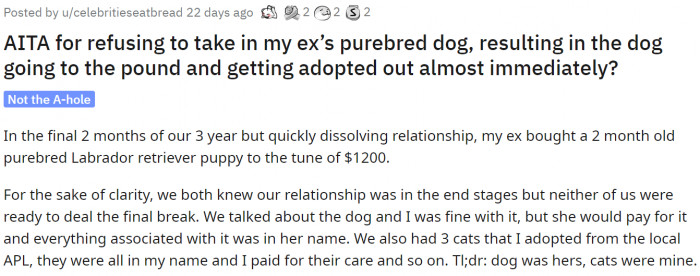
This Woman Had the Nerve to Call Her Ex, Whom She Hadn't Spoken to in a Couple of Years.

She Should've Planned Everything in the First Place. Why Pass the Responsibility onto Her Ex?

The Dynamics of Responsibility
When relationships end, the dynamics of responsibility can become complicated, particularly when pets are involved. According to a study published in the Journal of Social and Personal Relationships, individuals often experience a sense of attachment and responsibility towards pets that mirrors their feelings towards human partners. This phenomenon can lead to emotional conflict when the relationship dissolves, as individuals grapple with feelings of abandonment and guilt associated with relinquishing responsibility for their pets.
Research suggests that the emotional bonds we form with pets can be as strong as those we form with people. A survey by the American Psychological Association found that pet ownership significantly contributes to emotional well-being, making it all the more painful when those beloved creatures are sent away, as was the case in this article.
He Gets Blamed in the End.
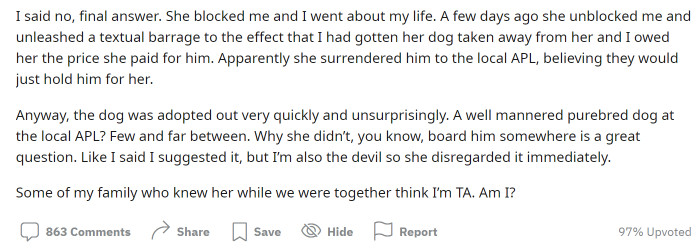
She Doesn't Deserve the Poor Dog.
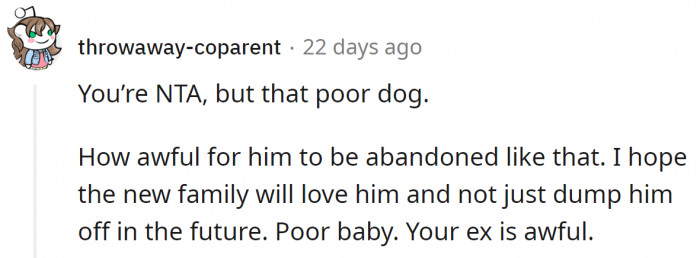
She Should Have Covered the Long-Term Boarding in the First Place, Not Impose on Someone Else.

In situations of emotional turmoil, such as breakups, the concept of emotional leakage often surfaces. This refers to the unintentional display of emotions that have not been fully processed. For instance, the ex-girlfriend's anger toward her ex-boyfriend for saving the dog may stem from unresolved feelings regarding the breakup itself. Studies have shown that unresolved emotional issues can manifest in unexpected ways, leading individuals to project their frustrations onto others, as seen in this dynamic between the ex-partners.
Research in interpersonal relationships indicates that the way we handle unresolved feelings can significantly affect our behavior towards others. When individuals do not adequately process their emotions, they may unconsciously redirect their anger or disappointment toward external targets, which can complicate post-breakup interactions.
She's Already a Stranger at This Point.

That's Right. He Should Just Ignore Her.

Who in Their Right Mind Would Ask Their Ex for Such a Big Responsibility?

The Role of Communication
Clear communication is vital in any relationship, and its absence can lead to misunderstandings and resentment. A study published in the Journal of Marriage and Family highlights that effective communication skills are correlated with healthier relationships and smoother transitions during breakups. The failure to articulate expectations regarding shared responsibilities, such as pet care, can lead to ongoing conflict, as seen in the ex-girlfriend's anger.
To mitigate such conflicts, experts recommend establishing clear boundaries and responsibilities before and after a breakup. This approach involves discussing each party's expectations to prevent misunderstandings and resentment. By doing so, individuals can reduce the emotional distress that often accompanies relationship dissolutions.
She Probably Is.

It's All on Her.
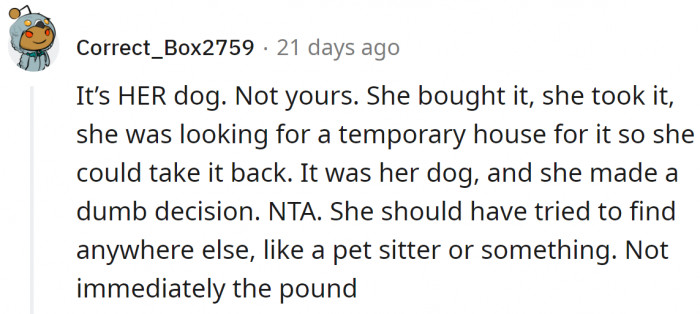
Blocking Is the Right Thing to Do After the Barrage of Messages.

Attachment theory offers valuable insight into the emotional reactions individuals may experience post-breakup, particularly regarding pets. According to Dr. John Bowlby’s foundational work on attachment styles, the bonds formed during relationships can influence how individuals react when those relationships end. For instance, someone with an anxious attachment style may struggle more with feelings of loss and abandonment, leading to heightened emotional responses like anger or frustration, as seen in this situation.
This framework suggests that the ex-girlfriend's anger could be a manifestation of her attachment style, indicating she may have difficulty coping with the loss of both her partner and her pet. Understanding one’s attachment style can facilitate better emotional regulation during breakups by helping individuals identify and address their emotional needs.
He's Definitely Not the A**hole Here.

The Right Thing to Do.

The Ex-Girlfriend Is Definitely the AH.
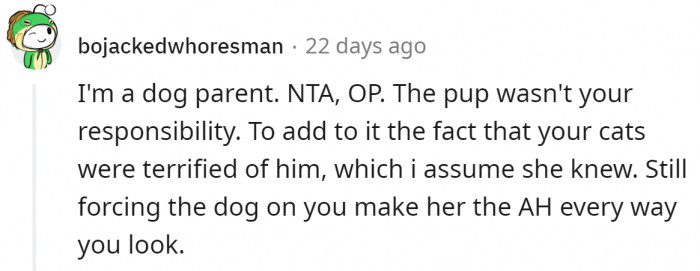
Behavioral Patterns After Breakups
Research indicates that individuals often display specific behavioral patterns following a breakup, which can include seeking closure or attempting to regain a sense of control. In the case of the ex-girlfriend, her anger may be a way to cope with the feelings of powerlessness that arise from the breakup and the subsequent adoption of her pet. The psychological concept of 'reactance' suggests that individuals may respond strongly to perceived threats to their autonomy, which could explain her strong emotional reaction.
Understanding these patterns can help individuals navigate their feelings more effectively. Psychologists recommend engaging in self-reflection and journaling to process emotions and gain clarity about their feelings toward the breakup and the associated responsibilities.
She Probably Would, Since She's This Crazy.
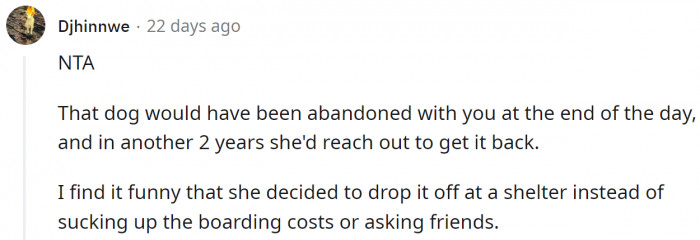
She Did Not Even Consider It.

She Probably Is?

Emotional regulation strategies are crucial during emotionally charged situations, such as breakups. Techniques such as mindfulness and cognitive restructuring can help individuals manage their emotions more effectively. Studies show that mindfulness practices can enhance emotional resilience, providing individuals with tools to cope with feelings of anger or resentment in a healthier manner.
In this scenario, the ex-girlfriend might benefit from mindfulness practices to acknowledge and process her feelings regarding the breakup without projecting them onto her ex-boyfriend. Engaging in activities that promote emotional well-being, such as yoga or meditation, can help create a sense of calm and clarity, allowing for healthier post-breakup interactions.
Others Would Take in the Dog Because They're Concerned for Its Welfare.
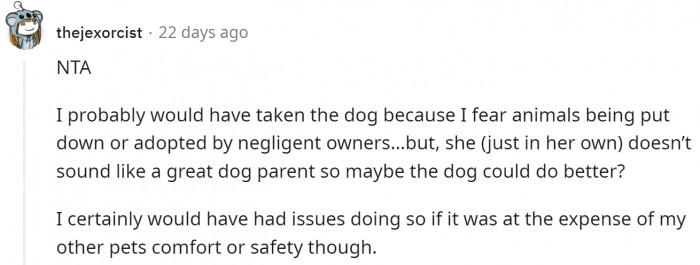
Maybe His Family Would Be Willing To.
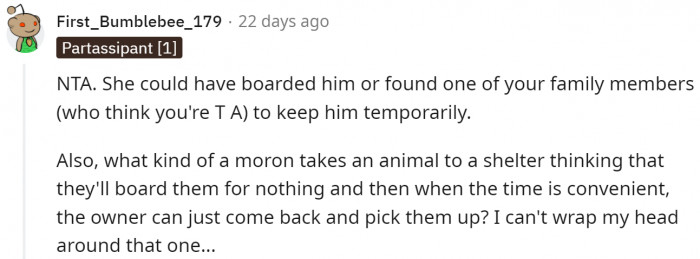
She Didn't Bother Reading the Agreement.
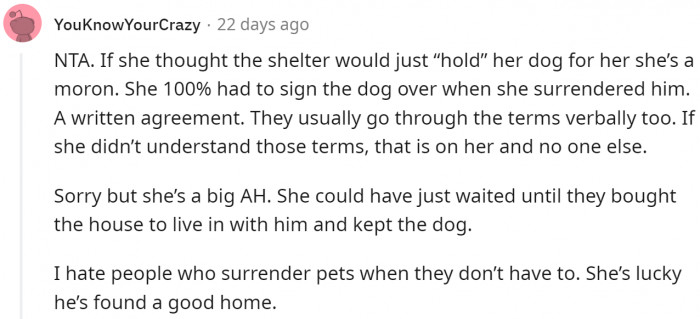
The Importance of Closure
Achieving closure after a breakup is essential for emotional healing, particularly when pets are involved. Research published in the Journal of Personal Relationships suggests that individuals who actively seek closure tend to experience less emotional distress and better psychological outcomes. This is particularly relevant in cases like the one described, where unresolved feelings regarding pet ownership can complicate the grieving process.
Experts recommend that individuals engage in closure-seeking behaviors, such as having an open conversation about expectations and feelings regarding shared responsibilities. Such conversations can help clarify misunderstandings and reduce the emotional burden of unresolved conflicts, allowing both parties to move forward more healthily.
Why Would He Be Blamed for Her Decision? It's Her Decision in the First Place.
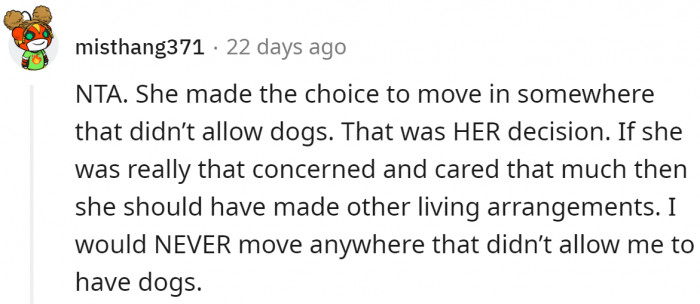
He's Not to Blame.
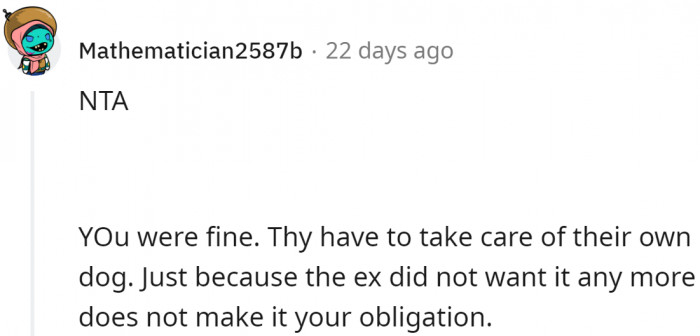
It's Possible That She Wouldn't Come Back for the Dog.
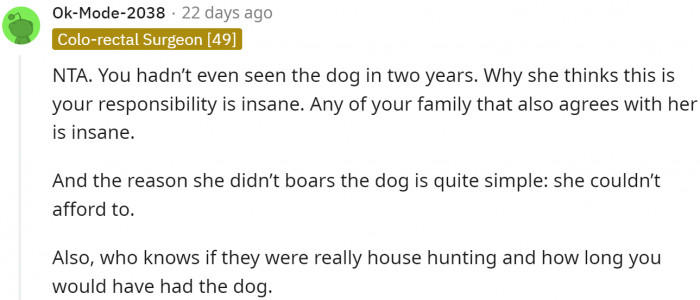
Finally, the psychological principle of boundary setting cannot be overlooked in this context. Healthy boundaries are essential for maintaining emotional well-being, especially post-breakup. Research has shown that individuals who establish and maintain clear boundaries are better able to navigate relationships and manage their emotional responses effectively.
In practical terms, both parties in this scenario could benefit from discussing and clarifying boundaries regarding their responsibilities toward the dog. This would not only alleviate some of the emotional tension stemming from the breakup but also ensure that the pet's well-being is prioritized in a collaborative manner.
The Dog Is Not His Responsibility. The Ex-Girlfriend Is the A**hole, Right?
A responsible dog owner would think about the welfare of their dog thoroughly. She could have asked around if there were other people willing to take her dog in.
Perhaps it's even better this way. We hope the dog is now happy in its forever home.
Psychological Analysis
The ex-girlfriend's anger might be a manifestation of unresolved feelings from their breakup, showing up as frustration over the dog's situation. It's common that when emotions aren't fully processed, they can leak out in unexpected ways. This is why it's so important to properly address and navigate our feelings, especially during major life changes like breakups.
Analysis generated by AI
Therapeutic Insights & Recovery
Understanding the complex emotional dynamics that accompany breakups, particularly when pets are involved, is crucial for navigating these turbulent waters. Research consistently highlights the importance of clear communication, emotional regulation, and boundary-setting in fostering healthier post-relationship interactions. As noted in various studies, engaging in constructive dialogue can pave the way for closure and understanding, minimizing emotional distress for all parties involved.
Creating a safe space for open conversations about responsibilities and feelings can not only benefit the individuals but also ensure that any shared obligations, such as pet care, are managed effectively. Ultimately, the ability to process emotions and establish healthy boundaries can transform a painful breakup into an opportunity for personal growth and improved relational dynamics.



